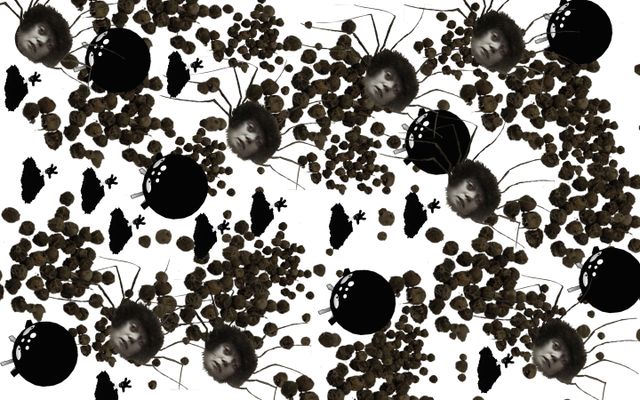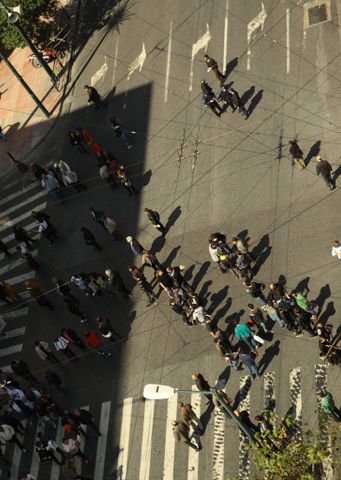Plenum, Discussion, Performance
(Un-)Learning Place — Public Program
With Each One Teach One (EOTO) e.V., knowbotiq, Raumlabor Berlin, Tactical Technology Collective, Telekommunisten and many more
Foyer, Auditorium

During the Opening Days of HKW’s new long-term project The New Alphabet in January 2019, HKW sets up a space for gathering, discussion, and workshops from January 9 to 13, 2019—a unique (Un-)Learning Place.
Departing from the assumption that the present is characterized by a crisis of the established epistemic-political order, the (Un-)Learning Place seeks out strategies to navigate through the inherent classification and ordering systems of archives, libraries, museums, institutional architectures, and digital networks and offers approaches to situating, negotiating, or “(un-)learning” research in artistic, site-specific, poetic, or bodily practices. Together with eight independent curatorial, activist, or artistic collectives, the (Un-)Learning Place offers its 80 international participants the opportunity to investigate new strategies for interdisciplinary research and potential crossdisciplinary collaborations in five tracks: The Untranslatability of Translation; (Un-)Archiving; Against the Digital; Molecular Bodies; Spaces of Theory. On Sunday the campus ends with a public open plenum and a performance by knowbotiq.
With ASSET Production Studio, diffrakt | centre for theoretical periphery, Each One Teach One (EOTO) e.V., knowbotiq, Raumlabor Berlin, Tactical Technology Collective, Telekommunisten, Gigi Argyropoulou (researcher and curator), Gilly Karjevsky (curator), Nicoline van Harskamp (artist), participants of the (Un-)Learning Place and many guests
(Un-)Learning Place curated by Boris Buden and Olga von Schubert
Scenography: Raumlabor Berlin
Program
1.30 pm–3 pm
Public Open Plenum (Un-)Learning Place
Discussion
On Sunday, participants of the five day curriculum open up their plenum to the public to provide insights and further discuss the questions they pursued during the week: What should be unlearned and what could institutions of un-learning look like? Specifically, what should The New Alphabet School (2019–2021) at HKW look like in order to facilitate the activist, artistic and research practices of its participants? What should be the relation between active contributors and the general public? The plenum will be chaired by the participants of the (Un-)Learning Place.
3 pm–4 pm
manYdancing the molecular ornaments
knowbotiq (artists’ collective), Claudia de Serpa Soares (dancer), Nicolas Buzzi (musician, composer), Lamin Fofana (artist and DJ)
Collective, participative dance performance
In a present in which algorithmic control mechanisms and biotechnologies fragment and molecularize the body, this performance invites audience members to temporarily link up with “undisciplined” collective bodies and corporeal landscapes by means of portable body prostheses and rhythmic sound patterns.
Szenography
Raumlabor Berlin
Installation by Markus Bader and Alexa Szekeres, 2019
In a scenography developed by Raumlabor Berlin in consultation with eight Berlin collectives, an (Un-)Learning Place is being staged from January 9 to 13 to mark the launch of The New Alphabet School. Inspired by the language of form in the work of Italian designer Ettore Sottsass, the sculptural works of Isamu Noguchi, and Aldo van Eyck’s educationally progressive playground architectures of the post-war period, Raumlabor Berlin creates situations in which collective approaches to learning and un-learning can be tested. Workshops by ASSET Production Studio, diffrakt – Zentrum für theoretische Peripherie, Each One Teach One (EOTO) e. V., Fehras Publishing Practices, knowbotiq, Raumlabor Berlin, Tactical Technology Collective and Telekommunisten propose different approaches and strategies with diverse linguistic classification systems: For example, a lexicographic laboratory examines the language of the art world; a small library reclassifies its collection of black authors – in an attempt to overturn existing categorizations; and a survey of global, natural history collections proposes a new perspective on museum taxonomies that takes account of the extinction of species. As part of the event series The New Alphabet School, this architecture will be on view in ever-new guises over the next three years at the HKW.
Installations
knowbotiq
Amazonian Flesh – How to Hang in Trees During Strike
Fabulations on Cocoons of Idleness, Installation, 2018
Shortly after seizing power, the Chinese Communist Party resolved to rapidly expand the labor force. They called upon the masses to move into the cities to seek work in the newly erected factories. However, the new arrivals – alarmed by the noise of the machines and the agitation of the workforce – made a completely disoriented impression. Consequently, it was decided that for a certain period of time these people should be assigned no other task than that of simply moving freely through the workplace environment in order to acclimatize their bodies to the new conditions. What would happen, if the new arrivals in today’s global corporations chose not to take up their almost fully automated work – which applies metadata, profiles, and bots to continually control and organize all movements and desires – and to fully abandon themselves to idleness? Could they thus begin to renounce their faith in the religion of wage labor? Would the bots and the Artificial Intelligence within their logistic working environment pledge solidarity with them?
Amazonian Flesh is a project by knowbotiq commissioned by Interkultur Ruhr and the research project Reconfiguring Anonymity, supported by the Office of the Federal Chancellor, Austria / Art and Culture and Kulturbüro Dortmund.
Each One Teach One (EOTO) e.V.
A Library of Authors from the African Continent and African Diaspora
Parts of the library, 2019
From the 1970s onwards, the Afro-German activist Vera Heyer (1949–1995) began amassing a collection of books by black authors. Since March 2014, EOTO, a community-based education and empowerment project in Berlin-Wedding, has been working to fulfill her wish of making her legacy accessible to the public in the form of a library after her death: This reference library contains works by authors of the African continent and the diaspora, and documents black history up to the present day – both within Germany and abroad. The library now holds some seven thousand books, comprising mainly African and African diaspora literature, and includes German, English, and French fiction and non-fiction, in addition to pamphlets and newspapers. Alongside the standard categories, the library boasts sections such as African Literature, American Literature (including North, Central and South America), together with categories such as Award Winning African Literature, Colonialism and Resistance, Gender Studies, Black People in Communism and Labor Movements, Afrofuturism, Black Panther Party, Contemporary Art, and Literature and History of Black People in Germany.
ASSET Production Studio
Prototype for a Museum of Man
Interactive collage, 2019
How is the cultural program of human exceptionalism (i.e. “anthropo-supremacy”) instantiated in museological scenography, narrative, and display? How do museums of natural history, ethnography, and science and technology reinforce ideas of human exceptionalism? What scenes, sleights, and normalizing gestures subtend this pervasive cultural agenda? And, how is this globalized disposition also “localized” to support various nationalist chauvinisms and forms of white supremacy and hetero-patriarchy? The material collected here is an early and experimental prototype for a Museum of Man yet to come, which aims to produce a counter-taxonomy of the technologies of human exceptionalism in museological cultures past and present. The work is a first step toward a more comprehensive and collaborative inquiry into the invention of “Man” and the consequences of his imagined dominion over nature.
